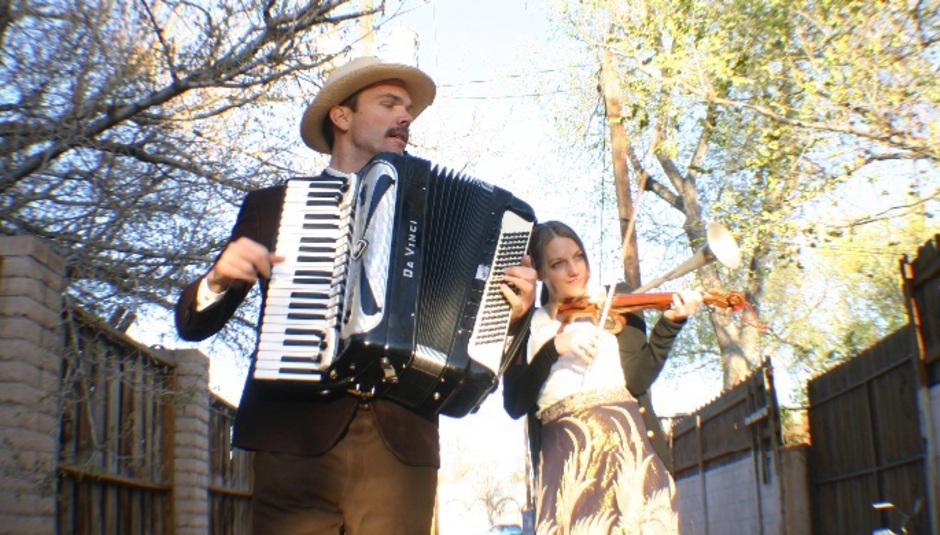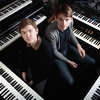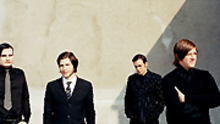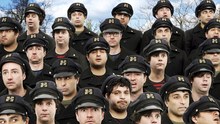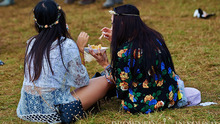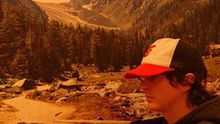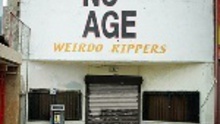Jeremy Barnes has nothing to prove. Not only did he play drums in one of the most significant indie bands ever – Neutral Milk Hotel – forging close links to the highly influential Elephant 6 collective, more recently he’s made a name for himself with A Hawk And A Hacksaw, his rigorously studied and richly authentic celebration of Eastern European music.
Next month, he and violinist Heather Trost will be visiting these shores to perform their live score to the film Shadows Of Forgotten Ancestors. The movie was made behind the iron curtain in the mid-1960s and is a surreal and psychedelic love story, fully immersed in the Eastern European folk culture that A Hawk And A Hacksaw evoke so effortlessly.
As well as at a special screening for DiS and Sensoria in Sheffield, the score will be performed at ATP curated by Jeremy’s elusive former Neutral Milk Hotel bandmate Jeff Mangum. We’re so damn excited about the whole thing, we decided to Skype Jeremy, and after telling us about his chilli farm he told us all about Shadows Of Forgotten Ancestors, Neutral Milk Hotel’s legacy, and the mysterious Mr Mangum.
DiS: How long have you wanted to do a live score?
Jeremy Barnes: I first saw Shadows Of Forgotten Ancestors about 12 years ago, and visually and aesthetically it was a huge influence on me. A lot of the music in the soundtrack is really beautiful and I wanted to work with that, and work with the dialogue. The idea is that our music is almost like a character in the film, commenting on things. There’s a certain kind of magical realism to the film and I think that what we are doing adds to that because there are multiple layers going on between folk legend and reality and magic, and paganism and Christianity as well. There’s all these multiple layers going on so we thought it would be nice to add one more.
DiS: Did you feel a certain amount of pressure to remain faithful to the original score?
JB: Some of the score is really great Ukrainian folk music and we used a lot of that. We learned some of the Hutsul songs – the Hutsul are a community who live in the Carpathians and this film takes place in the Hutsul world. One of the problems I did have with the film though is that some of the score is like sixties, syrupy, generic film soundtrack music and it’s not really folk music – it was done in a studio later. Considering the amount of work that went into representing every other aspect of this folk culture, I felt like the score should have been only folk music, so we went through and basically edited out all the stuff that was done in a studio. We did a few folk songs but then we also wrote some stuff in that vein, like we do. I feel like it takes it out of that syrupy, sixties film soundtrack place and puts it in a new place.
DiS: Was it important to pick a film that matched the kind of music you make?
JB: Yes, definitely. We wouldn’t do this with just any film. To do it live and to be there playing along with it is such a nice way to bring music out to people. I think a lot of people expect a certain thing from Eastern European music – a certain cliché – and this doesn’t provide that at all, it’s a whole other world. It’s talking about religion and magic and paganism and all sorts of stuff. People often think, well, it’s just going to be a big Eastern European dance party. There’s so much more to the culture than that and this film really portrays the deep richness of a lot of Eastern European culture.
DiS: Are there other films you’d like to try? I wonder if you would want to do anything that’s a bit less of an obvious match? I’m not saying you should do an American Pie soundtrack, but you know what I mean.
JB: It’s not something I want to do every year with a different film. This is something special and it’s a perfect match. Not only does this film show this folk culture, it’s also pretty psychedelic. It was done in 1964 and when you see it you’ll be amazed. If you think about what else was going on in film and music in 1964, it just wasn’t that much – at least in mainstream culture – but these filmmakers really pushed the boundaries as far as psychedelic effects go. It’s a great story but it’s very strange visually and really well done. It takes a really good film to want to do this. It’s 92 minutes and we’re doing 15 concerts. If it wasn’t my favourite film I don’t know if I’d want to do that.
DiS: Is this always going to be a live project or is there going to be a physical release, on CD or DVD?
JB: We have been recording the songs that we wrote and it will come out on CD. We haven’t really talked to the Russian film council about an accompanying DVD release. I’m not sure they’re at the point where they want to reissue it, but that would be amazing. I feel like it deserves more attention, it’s a great film. One of the reasons why we wanted to do it is because most people haven’t seen it. If people have of heard of [Sergei] Parajanov , the director, they’ve heard of his other films and not this one.
DiS: So you were motivated by encouraging more people to try and see this film?
JB: Definitely, and for people who know our music or like our music, it’s very easy for them to come into the film and fall in love with it.
DiS: Maybe I’m over-egging it, but are you partly motivated with the band in general to get more people listening to Eastern European music which, to most people, is quite a niche concern?
JB: In a way, yeah, but I don’t want to popularise it. We’re not going to become a big band or anything. There are other bands who are a lot more mainstream who are doing Eastern European music, but I feel like there are people out there who don’t know about it who should and they need to find us!
DiS: When writing this score how far were you limited by the fact that you would have to do it live?
JB: We were limited in some ways because we’re playing as a duo and we’re also travelling. We’re flying, so we can’t bring a lot of instruments. But then on the other side it’s also liberating because this is a completely different way of presenting live music - working with silence and working with extremely quiet parts and working with visuals totally changes everything. It’s this whole different experience from just playing a show where people are standing, drinking, expecting a show. When we play live with the film we’re not even lit up. We’re on the side of the stage. Visually it’s all about the film, and so we’re there to support it. In that way it's extremely liberating and people have to listen. I feel like the marriage of audio and visual is becoming more and more important to the way people listen. People have changed the way that they listen to music these days because it’s so present, it’s everywhere and it’s always on, but when you put it together with visuals you can take more steps towards really listening and that’s important.
DiS: In Sheffield, where you’re playing [St George’s] is an old church but it’s also now a lecture theatre, so it’ll probably have quite a strange vibe. Will it benefit from such an unusual setting?
JB: Definitely. We played at a church in Norwich. It’s really interesting being in a church, watching a film that often takes place in a church, but also addresses paganism and things like that. It depends on the country you’re in too. Some people are still very involved in church, are still very aware of it. In England it’s interesting because a lot of churches have been deconsecrated and are no longer what they were, they no longer mean the same thing to the people.
DiS: And in general, coming to the UK, is that something you always look forward to? Am I right in thinking you lived over here for a couple of years?
JB: Yeah, I did. I love it there. People love music there and shows are always good because people are great in the UK. They’re very open to things and they’re also well-informed. In some countries people expect some Eastern European cliché dance party, where everyone’s supposed to be very drunk and that’s not what we do. People in the UK don’t necessarily expect that, which is nice.
DiS: Obviously one of the big things when you’re over here will be the All Tomorrow’s Parties festival. Just looking at the line-up, there’s you, there’s Jeff Mangum, The Olivia Tremor Control, The Apples In Stereo. It’s almost going to be like a big Elephant 6 family reunion isn’t it?
JB: That’s true, it’s crazy. All of those people haven’t been in the same room together for years so it’ll be nice.
DiS: Does Elephant 6 still exist in any sense?
JB: It was always very loose. There was never an office! It does exist, but I don’t think anyone knows or can define how it exists. To me it’s a group of friends who grew up together in Louisiana, and they made music and they shared tapes and they went on to make records, and as it grew it changed, and it contracts and expands, but in the end that group of friends are still friends and they still trade tapes and they still talk about music with each other and in that sense it does still exist.
DiS: Do you still stay in touch with all of that old crowd?
JB: I’m in touch with [former Neutral Milk Hotel bandmates] Jeff and Scott and Julian. We saw each other recently, which was nice. I live in New Mexico so those guys don’t get out here very often. Not many bands do. I’m kind of on my own here. When I play in Georgia I see people but it’s not very often that everyone is together at once so that will be nice.
DiS: One thing that’s going to loom large over the whole ATP weekend is the very fact that it’s happening, with Jeff not having played live for so long and then gradually doing more shows and suddenly announcing that this was happening. What do you make of his return to the music industry?
JB: I think it’s great. I‘ve been telling him to do it for years. The songs are great – why not go out and play them? I feel like he’s happy doing it now and he’s realised it’s so nice to hear people enjoy them. When we were actually a band we didn’t have much success so people didn’t know the music. It was only after we broke up that things began to pick up for the band. He never got to experience the joy and the love that people have for his music. He shied away a little bit and didn’t know how to take it, but I think now he’s playing live, and he can address it and be in control, and choose where he wants to play and choose the bands he wants to play with, he’s really enjoying himself. I’m really happy for him.
DiS: It may be prying a bit, but I do wonder what he’s been doing all this time. Has he just been working in an office?
JB: No, he’s fortunate to make money from royalties so he doesn’t have to work, but he records a lot of music. He sends me a lot of great music that he doesn’t want to release but he’s still busy as an artist. He’s just not a songwriter, at least at this point, and he’s not interested in releasing anything. I feel like he’s happy with what he’s given to the world but that doesn’t necessarily mean he’s not going to continue producing. It just means that he’s not going to release anything, and that frustrates a lot of people who think that they deserve to hear what he’s doing but it’s up to him. I’m just happy that he’s healthy and doing what he’s good at. He’s good at making art and he’s still doing it. A lot of people think he was kind of like a Syd Barrett character but that’s not true at all. He doesn’t do drugs, he’s a vegan, he takes a lot of vitamins and he draws pictures and records music. It’s not a bad way to live.
DiS: You touched on it before – the way the band became more successful after it ended. It must be nice that Neutral Milk Hotel are still held in such high esteem by so many people, but on the other hand perhaps frustrating that it didn’t happen at the time.
JB: In a way I think it’s good that it didn’t happen at the time. It was a struggle to try and tour with no money but I wouldn’t be doing what I do now without my experiences in the band. I was 19 when I joined that band – I was a year out of high school, a year out of living at my parents’ house and I was in New York playing with this band. It was a wonderful time, and in a way I think the fact that we didn’t have success at the time really helped each of us. I’ve definitely got a different view of what I want to do musically and artistically because of that whole experience. I’m very grateful that it happened the way it did.
DiS: Silly question perhaps – any chance of a full Neutral Milk Hotel reunion at ATP?
JB: I don’t think so. We’re on tour so we’re playing and then flying to Berlin. I’m sure that Scott and Julian will probably sit in with Jeff but I don’t know if I’m even going to be there for his show. So no!
DiS: What are your plans for the rest of the year?
JB: We’re touring in May. We’re heading east to Poland and Turkey and Vienna, and then in the summer I think we’re doing some things in France and we’re playing some Jewish weddings – that’s what we do sometimes to make some extra money. And then in the fall we’re doing the film here and I think that’s when the record will come out. We put out our own music now [on L. M. Dupli-cation] and we’re putting out another record in April. It’s a reissue of a set of recordings by this Appalachian singer called John Jacob Niles. His music is amazing. He has an incredible voice. So we’re doing that and hopefully we’ll be releasing something else this year from another artist but we’re still working on that.
DiS: You’ve obviously got an incredible enthusiasm for Eastern European music. When you go over there do the audiences take it like that, when you’re this American guy coming over and doing their music?
JB: We lived in Hungary and that helps a lot. We’ve travelled to a lot of Romania and Greece and Serbia and Poland and Turkey. When we go over there we’re definitely embraced. That’s what I wanted as a band. We get more heartache from people in America, which is interesting. They think we’re not legit or something, but then we go over there people love it, and those are the people who know the music so that makes me really happy.
DiS: Is it a bit of a battle? I’m not suggesting in any way it is, but you could see why people might see it as a bit of a gimmick.
JB: Oh sure, and of course people should be aware of that. There are some bands out there that are complete gimmicks that I see through and I can’t believe that it works for them. But we have our own way of presenting it and we do write our own music for the most part. We learn traditional music, we play traditional songs, but we focus on writing our own music and I don’t want to push it into the mainstream or make those choices that dumb it down. We just approach it with a lot of respect and a lot of love and people, when they see us in Poland or wherever in Eastern Europe, they get that, so that makes me really happy.
DiS: It seems, looking back over A Hawk And A Hacksaw’s back catalogue you’ve become, if anything, more absorbed in that music and those influences have become more prominent. Can that go any further, or are you totally immersed in it now? Are there still other tangents you want to explore in it?
JB: We’re definitely immersed in it but it’s such a big region and that’s what people forget too. There are counties in Romania where one county has different music from the neighbouring county, then you compare that with Turkish music and Greek music and Bulgarian music. There are similarities and there are some aspects that are the same, but really there’s so much there. I don’t need to explore other music while I’m doing A Hawk And A Hacksaw. I’m happy to do other things with other musicians that don’t involve Eastern European music, but this band is about exploring and commenting on that whole world.
DiS: It still sounds like there’s plenty of ground left for you to cover then.
JB: Yes, definitely. I want to do this when I’m an old man.
A Hawk And A Hacksaw will be performing Shadows Of Forgotten Ancestors at the following dates:
March 3rd - Sheffield, St George's Church (Dis and Sensoria Present)
March 4th - Edinburgh, Filmhouse Cinema
March 5th - Leeds, Hyde Park Picturehouse
March 8th - Cardiff, Chapter
March 6th - Reading, South Street
March 7th - Colchester, Arts Centre
March 9th-10th - Minehead, ATP curated by Jeff Mangum

